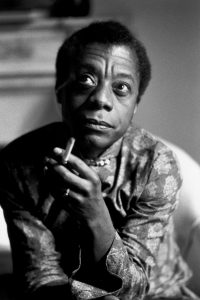
“An artist is a sort of emotional or spiritual historian. His role is to make you realize the doom and glory of knowing who you are and what you are. He has to tell, because nobody else can tell, what it is like to be alive.” – Baldwin for LIFE Magazine, May 1963
Biography:
James Baldwin was most widely known as a novelist, essayist, and playwright who gained notoriety for his essays and other writings accounting his experiences as a black man in America. Baldwin was born August 2, 1924, in Harlem, New York. Early on in his life, Baldwin developed a love for reading. He worked on the DeWitt Clinton High School’s magazine and had his own poems, short stories, and plays published within. After Baldwin graduated high school, he delayed college plans to support his family through various jobs.
Baldwin lost his father on July 29, 1943 and shortly thereafter moved to the artistic hub of the Greenwich Village in New York City. He was soon getting essays and short stories published in national periodicals, and after moving to Paris, began splitting his time between the US and France. His first book, “Go Tell It On the Mountain,” explored growing up as a young black man in Harlem, his father, and religion, and was written and published in Europe.
After receiving a Guggenheim Fellowship in 1954, Baldwin published his next novel, “Giovanni’s Room.” Homosexuality, which was highly taboo and misrepresented at the time, was portrayed in this and Baldwin’s later novels. Through his essays, primarily “Notes of A Native Son” and “Nobody Knows My Name: More Notes of A Native Son,” Baldwin became one of the most prominent figures in the Civil Rights Movement for his unflinching writing on race.
Following “the Fire Next Time”, Baldwin’s bitingly candid essay collection depicting race relations in America, his optimism for change became less notable in his work. The violent racist deaths of Medgar Evers, Malcolm X, and Martin Luther King Jr. spurred Baldwin’s disillusionment which began to show through in his writing, according to critics. In the years leading up to his death in 1987, Baldwin taught at the University of Massachusetts Amherst and Hampshire College. He passed away at his home in St. Paul de Vence, France.
“ Well (others have told you)
your clown’s grown weary, the puppet master
is bored speechless with this monotonous disaster,
and is long gone, does not belong to you,
any more than my woman, or my child,
ever belonged to you.
During this long travail
our ancestors spoke to us, and we listened,
and we tried to make you hear life in our song
but now it matters not at all to me
whether you know what I am talking about—or not:
I know why we are not blinded
by your brightness, are able to see you,
who cannot see us. I know
why we are still here. “
(“Staggerlee wonders,” James Baldwin, 1983)
Works:
- Go Tell It on the Mountain (semi-autobiographical novel: 1953)
- The Amen Corner (play: 1954)
- Notes of a Native Son (essays: 1955)
- Giovanni’s Room (novel: 1956)
- Nobody Knows My Name: More Notes of a Native Son (essays: 1961)
- Another Country (novel: 1962)
- A Talk to Teachers (essay: 1963)
- The Fire Next Time (essays: 1963)
- Blues for Mister Charlie (play: 1964)
- Going to Meet the Man (stories: 1965)
- Tell Me How Long the Train’s Been Gone (novel: 1968)
- No Name in the Street (essays: 1972)
- If Beale Street Could Talk (novel: 1974)
- The Devil Finds Work (essays: 1976)
- Just Above My Head (novel: 1979)
- Jimmy’s Blues (poems: 1983)
- The Evidence of Things Not Seen (essays: 1985)
- The Price of the Ticket (essays: 1985)
Links to speeches/relevant videos:
- A Message to Black Youth, Baldwin speaks to students at inner-city Oakland’s Castlemont High School, 1963
- Famous clip of Baldwin’s speech at Cambridge University during a debate with William F. Buckley, 1965
- James Baldwin interview on being black in America, one particularly significant clip starts at 8:50
- Speech on a black US president, 1965
- Dr. Cornel West on the unpopularity of James Baldwin, 2017
Sources:
- Collected Essays: Notes of a Native Son, Nobody Knows My Name, The Fire Next Time, No Name in the Street, The Devil Finds Work, Other Essays (Toni Morrison, ed.) (Library of America, 1998), ISBN 978-1-883011-52-9.
- “James Baldwin.” Biography.com, A&E Television Networks, 15 Apr. 2019, www.biography.com/writer/james-baldwin.
- “James Baldwin.” Poetry Foundation, Poetry Foundation, 2019, www.poetryfoundation.org/poets/james-baldwin.